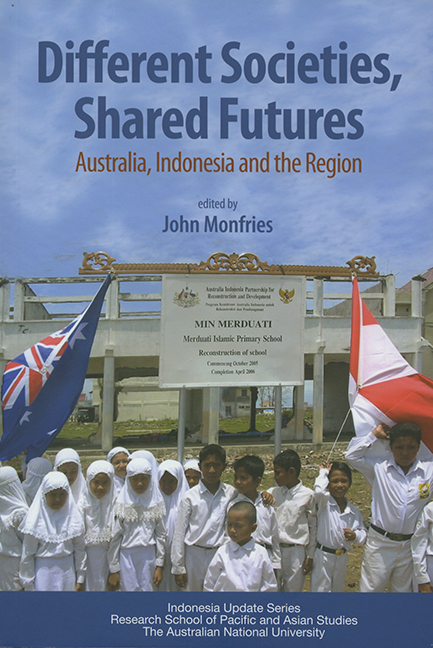Book contents
- Frontmatter
- Dedication
- Contents
- Tables
- Figures
- Contributors
- Acknowledgments
- Opening Address by Richard Woolcott AC
- 1 Introduction
- PART I Regional Viewpoints
- PART II Security Aspects
- 5 The New Australia–Indonesia Strategic Relationship: A Note of Caution
- 6 The War on Terror: The Primacy of National Response
- PART III Mutual Perceptions and Irritations
- PART IV The Economic Partnership: Aid, Economics and Business
- PART V Conclusion
- Glossary
- References
- Index
5 - The New Australia–Indonesia Strategic Relationship: A Note of Caution
from PART II - Security Aspects
Published online by Cambridge University Press: 21 October 2015
- Frontmatter
- Dedication
- Contents
- Tables
- Figures
- Contributors
- Acknowledgments
- Opening Address by Richard Woolcott AC
- 1 Introduction
- PART I Regional Viewpoints
- PART II Security Aspects
- 5 The New Australia–Indonesia Strategic Relationship: A Note of Caution
- 6 The War on Terror: The Primacy of National Response
- PART III Mutual Perceptions and Irritations
- PART IV The Economic Partnership: Aid, Economics and Business
- PART V Conclusion
- Glossary
- References
- Index
Summary
Oh wad some power the giftie gie us
To see oursels as others see us!
It wad from monie a blunder free us,
An’ foolish notion.
Robert Burns, ‘To a louse’, 1786A NEW START?
No one watching relations between Australia and Indonesia in 2005 can have failed to notice a new sense of promise – at least as viewed from Canberra. For the first time since 1996, Indonesia has seemed to offer Prime Minster John Howard's government more opportunities than problems. The problems have been real enough of course: not only the second Bali bombings, but the trials of young Australians on drug charges which have generated a lot of attention and a little reflex hostility towards Indonesia among Australians, and reciprocal prickliness from Indonesians in return. But at the national level serious commentators have observed that the atmospherics of the relationship have regained a little of that sense of possibility that we last saw in the time of former Prime Minister Paul Keating.
Two factors seem to have contributed to this. The first is Indonesia's new president, Susilo Bambang Yudhoyono (SBY), whose effect on the relationship was most clearly demonstrated by his visit to Australia in April 2005. This was the most successful visit here ever by an Indonesian leader. SBY is the first Indonesian leader who can connect directly with Australians. Indonesia's previous leaders by contrast have all been more or less incomprehensible to us, both as politicians and as people. Moreover, SBY's predecessors have evidently made little effort to understand Australia. In this too SBY is different, as Opposition Leader Kim Beazley said soon after the president's visit:
There's no politician as substantial as President Yudhoyono who has so clearly understood this country, understood our fears, understood our sensitivities, understood the contribution that we want to make and comprehended the value of the relationship. He is a totally different leader. He wants to understand Australians; what makes us tick, what we stand for and our hopes and fears for the future (Beazley 2005).
- Type
- Chapter
- Information
- Different Societies, Shared FuturesAustralia, Indonesia and the Region, pp. 41 - 53Publisher: ISEAS–Yusof Ishak InstitutePrint publication year: 2006

